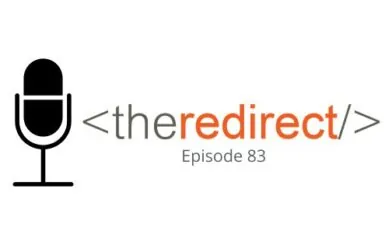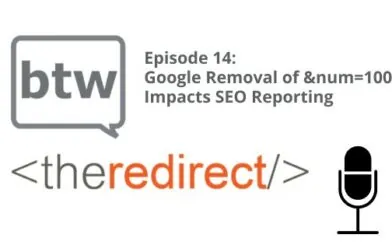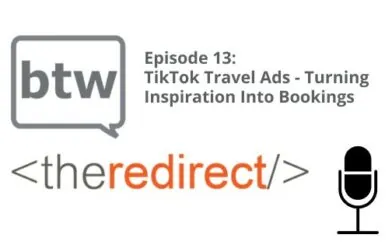Episode 30 / January 19, 2018
Listen now:
In this episode of The Redirect Podcast:
- Social Media Algorithms (begins at 1:15)
- Google Page Speed (begins at 7:42)
- Snippets & Page Description Lengths (begins at 9:26)
- Appointment Booking through Bing Local (begins at 17:06)
- 2017 Holiday E-Commerce Stats (begins at 20:10)
What To Do About Social Media Algorithms
As with Google search engine results pages, which have been changing to keep viewers on the page with featured snippets, answer boxes, and some of the changes we’ve seen recipes, etc., social media platforms also want to keep users on their sites and in their apps.
On the heels of Facebook’s change last week, today’s Whiteboard Friday from Moz asked the question, “Should SEOs & Content Marketers Play to the Social Networks’ ‘Stay-On-Our-Site’ Algorithms?”
The social media platforms favor posts that is considered “native” content – images, text, and videos that are uploaded to the site, and that don’t include outbound links that direct bring users away from the social platform. Good for the social networks, and somewhat good for brands in the sense of building awareness and community.
As marketers, we want to attract users away from the social media site and to our website so they can learn more and we can move them closer to conversion. Good for brands, bad for social networks.
Rand poses a couple reactions to the “stay on the platform” scenario: Play to the algorithms, or “forget” the algorithms? His advice is to create a balance of playing into the algorithms, but tip the scale in favor of your website.
We agree this is the way to go, the reason being there is a purpose for both, right? Playing to the social media algorithms by posting content that keeps people on the site, and has the potential for more engagement, presents opportunities to grow awareness for your brand and build a sense of community.
But, as Rand points out, what is the value of your social media post reaching a few of your followers, versus the value of linking out to your site on the social network, which brings a new lead to your website and ends in conversion?
In your social media strategy, strike a balance that works in your favor by sucking up to the algorithm and mixing in valuable outbound links.
Google Page Speed Update
As an add-on to last week’s discussion around Google’s page speed test tools being updated, they (Google) have come out and stated that page speed will become a ranking factor in mobile search – starting sometime in July 2018. This will be known as the “Speed Update” and is to only affect pages that deliver the slowest experience to users. This update is pretty agnostic to technology being used to power websites and build pages, as noted by the Google team.
New Page Description Length
It’s time to change how we write page descriptions. 156 character limits are dead. Long live 320 characters!
As an SEO, I (Patrick) have always had a love/hate relationship with page descriptions (meta descriptions). Though it has been said they are not a direct ranking signal in the Google algorithms, they play an indirect role in influencing clicks, therefore potentially increasing authority. Furthermore, this conversation point has changed, as it’s been suggested that Google is in fact placing more value on descriptions for SERPS.
The game has changed when going from 156 characters to 320 characters, as we’re no longer writing a quick informed summary of the page, but we’re now writing an entire paragraph summary of pages that often don’t have more than a few sentences of content on them. The content strategy evolves.
There are plenty of instances where Google won’t show your page description, even if you have a well-crafted description at 156 characters. (Read more from Yoast.) Now, at 320 characters, Google will more often opt to scrape content from the page rather than use your chosen description if they feel it’s not as informative as you have designated.
It appears this new length is more in line with the length of a Featured Snippet – the success of which could have been a driver for the expansion.
Appointment Booking with Bing Local
The new year is certainly bringing a round of changes to both Google and Bing. That’s right, I said Bing, a search engine we all too often are ignoring and I really don’t think we should be. It tends to sway toward an older demographic and perhaps those who are not as tech savvy, or who work for Microsoft.
Bing is also making changes to its local search landscape and recently they added a new feature to the local knowledge panel that allows users to book an appointment – something that has been available in Google since last year. While not yet available to everyone, the example used here is if someone does a search and a hair salon comes up, or a contractor’s name comes up, the searcher is able to book an appointment directly through the knowledge panel. It does direct you to a third-party site they’ve partnered with, but nonetheless, it’s another move in the pursuit of being more helpful to users.
2017 Holiday Marketing Stats
Adobe and and the National Retail Federation (NRF) came out with a report on the 2017 holiday e-commerce shopping season. Paid search and email campaigns were the biggest revenue drivers in 2017 holiday shopping season (via Marketing Land). No doubt the retail industry continues to shift and evolve, as 2017 was the year of major retailers going out of business, reorganizing and merging.
Big wins and highlights for 2017:
- Mobile shopping is on the rise – NetElixir stated mobile visits to sites increased 32%.
- Mobile accounted for 33% of sales generated.
- Salesforce says 46% of all online orders that happened on Thanksgiving Day took place on a mobile device, and the number of people shopping on Christmas day via mobile exploded to 50%.
- Paid search drew in the largest sales revenue for the companies mentioned in this article.
- Search drove nearly 45% of holiday visits, which broke down to 23% being from paid search, and 21% from organic.
Also mentioned in this episode:
- Last week, we published an outline on the changes taking place with Facebook’s news feed and how this affects the organic reach of your brand’s page. Be sure to check that out.
- From The New York Times: Alexa, We’re Still Trying to Figure Out What to Do With You
- From Search Engine Land: 80% of Google Home Results Come From Snippets
- From NPR and Edison Research: The Fall/Winter 2017 Smart Audio Report



